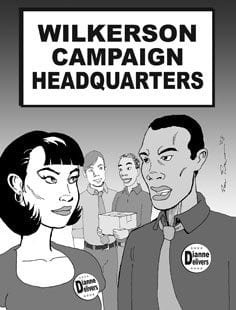
A worthy fight
|
|
“I hope the people deliver for Dianne in November.” |
In the memorable words of Yogi Berra, the former New York Yankees catcher, “It ain’t over till it’s over.” Dianne Wilkerson lost her bid for re-election to the Second Suffolk District seat in the state Senate by 228 votes in the Sept. 16 state Democratic primary election. Challenger Sonia Chang-Diaz out-pointed the incumbent, receiving 9,051 to Wilkerson’s 8,823. But Wilkerson plans to fight on in search of victory in November.
Her first step was to demand a recount, a common practice in close elections. Given Chang-Diaz’ small margin of victory — 50.64 percent to 49.36 percent, a difference of only 1.27 percent — it was advisable to determine the accuracy of the count. Also, the Boston Election Department reported that they had found 61 ballots that were not counted. Nonetheless, after last Saturday’s recount, the final tally was only modestly changed: 9,071 votes for Chang-Diaz and 8,858 for Wilkerson.
Still, the result was so close that Wilkerson has decided to carry her campaign to the Nov. 4 general election. Voters will be asked to write in her name or express their preference by affixing a sticker bearing Wilkerson’s name to the ballot. The extra effort required of the voter definitely makes Wilkerson the underdog against Chang-Diaz, whose name will appear on the ballot as the Democratic nominee.
Wilkerson ran a sticker campaign two years ago in the senatorial primary race. She received 6,473 votes against 5,711 for Chang-Diaz; however, almost 50 percent of the voters left the contest blank on their ballots. Turnout is typically far greater in presidential election years; with Barack Obama on the ballot this November, even more voters are expected. Wilkerson’s campaign will have to work extra hard to induce voters concentrating on Obama to take the time to write in for the senator.
One Boston columnist suggested that it was a violation of Democratic Party principles for Wilkerson not to accept the results of the primary. The journalist seems to have been unaware that the late, great congressman John Joseph Moakley ignored the primary completely in 1972 and ran as an “Independent Democrat.” He knew that he could never beat incumbent Louise Day Hicks in a crowded primary field, but he was victorious one-on-one in the November election.
Moakley’s campaign was dangerous for the Democrats because there was a strong Republican in the 1972 race, Howard Miller. This year, only Socialist Workers Party candidate William Leonard will appear alongside Chang-Diaz on the Second Suffolk senatorial ballot in November. Yet there was no suggestion in 1972 that Moakley had violated any party rules.
There are 40 state senators in Massachusetts, and only one is African American. Those who are young may not remember when the senatorial districts were gerrymandered so that it was impossible for a black candidate to win a seat. Local citizens had to sue to force the state to redesign districts in compliance with constitutionally protected voting rights. With Wilkerson on Beacon Hill, local residents knew that someone was tending to community interests.
It was a shock to the greater Roxbury community for Wilkerson to lose to someone unknown to them; Chang-Diaz has no involvement in community affairs there. Once again, the people face the possibility that their interests will no longer have a champion in the state Senate. It is interesting to note that Wilkerson won every precinct in which the residents are primarily African American, Asian or Latino. Chang-Diaz took the primarily white precincts.
Some analysts claim that this represents an old-fashioned race split, but that is too simplistic. Over the years, greater Roxbury has developed a multiracial and multiethnic culture with whites and others that might seem alien to some residents of the South End, Back Bay and parts of Jamaica Plain. For them, Wilkerson’s legal problems take precedence over the enormous work she has accomplished for the poor and for those struggling to find their place in American society.
So-called racial minorities and their allies understand that Chang-Diaz has a commitment to a political base that does not share their interests. Only a phenomenally successful sticker campaign by Wilkerson will prevent this political shift in November.






